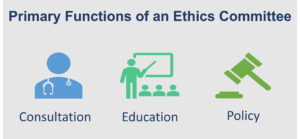Their Purpose, Creation and Operation
Ethics Committee Resources and Guidelines

Audio and Printable Resources
Ethics Committee Brochure Outline
Model Ethics Committee Annual Report Outline
Ethics Committee Handbook by Rosemary Flanigan, PhD
Blog: Code of Ethics Now Available for Healthcare Ethics Consultants
Blog: Strengthening Hospital Ethics Committees
A Status Report on Clinical Ethics and Hospital Ethics Committees
Measuring Impact of Hospital Ethics Committees
Articles from Bioethics Forum, Fall 1994, Volume 10
Clinical Ethics and Ethics Committees, by William G. Bartholome
To Feed or Not to Tube Feed: The Case of Jennie M.
Integrated Ethics Programs: A New Mission for Ethics Committees, by Myra J. Christopher
Ethical Decision Making in Managed Care Environments, by Judith Wilson Ross
Ethics Committees and Resource Allocation, by John D. Lantos
Learning to “Read/Hear”: Narrative Ethics and Ethics Committee Education, by Robert Lyman Potter
Consultectonics: Ethics Committee Case Consultation as Mediation, by Don F. Reynolds
The Voices of Nurses on Ethics Committees, by Cindy Hylton Rushton
Education of Ethics Committees, by David C. Thomasma
The Importance of Process in Ethical Decision Making, by Barbara C. Thornton

Ethics committees have three primary functions:
(1) CONSULTATION – To serve as a resource for patients, families and stakeholders to resolve difficult issues that
arise in patient care.
(2) EDUCATION – To provide continuing ethics education to the institution and more specialized training to EC members.
(3) POLICY – To participate in institutional policy formation and review to maintain and improve ethical treatment of patients on a systems level.
The following guidelines are provided for historical reference:
Ethical Guidelines in Managed Mental Health
Human Immunodeficiency Virus (HIV) Infection: Ethical Guidelines for Health Care Providers
Implementation of Patient Self-Determination Act of 1990
Meditations, William G. Bartholome, with preface by Don Reynolds and foreword by Myra Christopher

